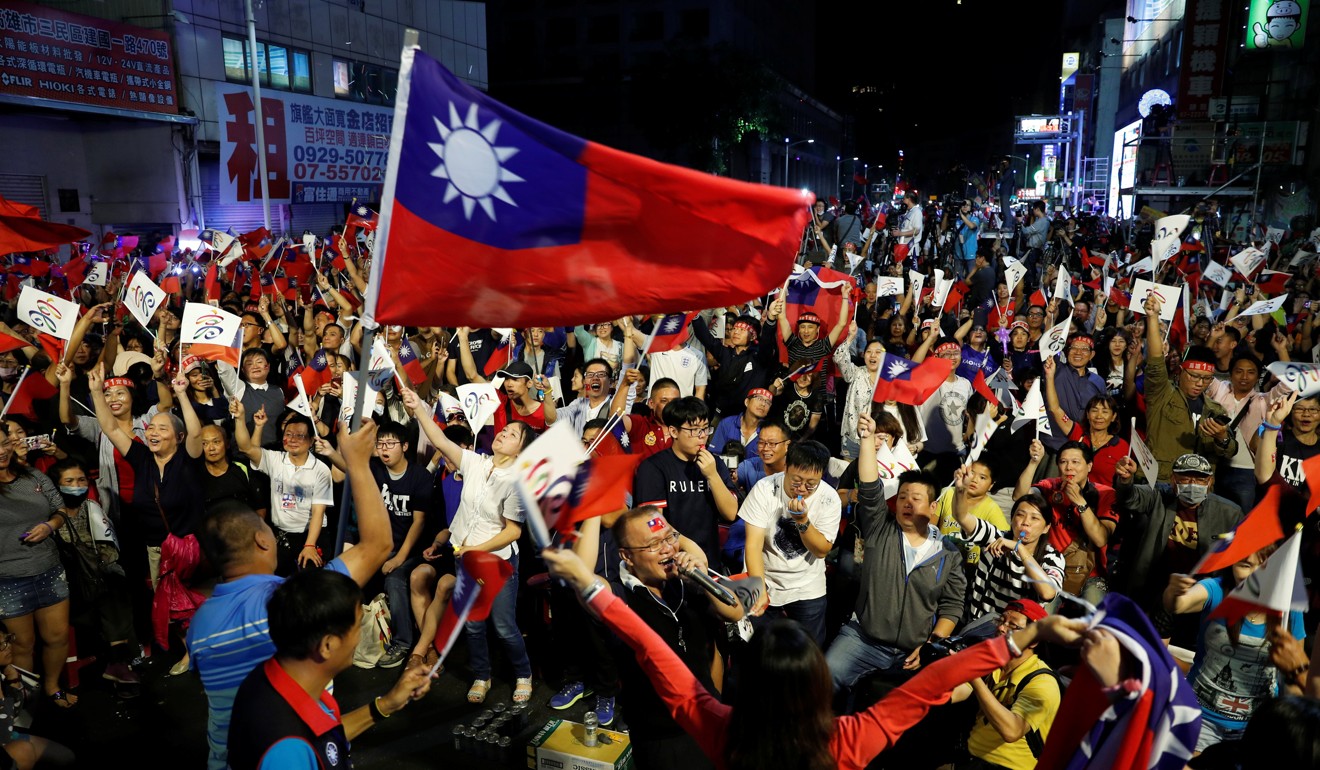
Taiwan President Tsai Ing-wen tells Beijing it ‘must’ respect island’s sovereignty, people’s choices
- Mainland must appreciate that ‘Republic of China, Taiwan’ has existed for a long time, leader says
- Choice of 23 million people to live in freedom and under a democratic system ‘must be respected’
Taiwanese President Tsai Ing-wen used her New Year’s Day speech to give Beijing a lesson in handling cross-strait relations, while promising to protect the self-ruled island’s sovereignty and its people’s livelihoods.
The message came just a day before Chinese President Xi Jinping is set give a speech to mark the 40th anniversary of a key policy statement, known as the “Message to Compatriots in Taiwan”, that eventually led to a thaw in relations with Taiwan.
Tsai said on Tuesday that Taipei would not give any ground on sovereignty despite her ruling Democratic Progressive Party (DPP) suffering a landslide defeat in the local government elections in November, when the opposition Kuomintang (KMT) won control of 15 of 22 cities and counties – including the former DPP stronghold of Kaohsiung.
Chinese president begins year of anniversaries with address on Taiwan
Some observers said at the time that the poll result reflected public support for the KMT’s more Beijing-friendly policies.
“I admit that the … local elections were the most serious critique of the ruling authority, but I must stress that the results did not suggest the general public was choosing to give up our sovereignty, nor did they reflect a desire among the Taiwanese people to make concessions on this issue,” she said.
Beijing must appreciate that the “Republic of China, Taiwan” had existed for a long time and it must respect the choice of Taiwan’s 23 million people to live in freedom and a democratic system, Tsai said.
It must also seek to resolve cross-strait differences through peaceful discussions and must hold government-to-government talks with Taipei through their authorised agencies, she said.
“Only with these ‘four musts’ can we determine whether cross-strait relations will head in a normal direction,” Tsai said.
Beijing considers Taiwan a wayward province awaiting reunification with the mainland, by force if necessary. It suspended official exchanges with Taipei after Tsai was elected president in 2016 and refused to accept the one-China principle, an understanding that Beijing says is the foundation of any exchanges between the two sides.
As China tests military muscle, PLA warns Taiwan efforts to resist reunification with force are dead end
Tsai said the island would face challenges from all sides this year, and cross-strait ties would be an important area of development.
“We never oppose normal exchanges between the two sides of the Taiwan Strait, nor do we oppose city-to-city exchanges, but such exchanges should be healthy, normal and without political preconditions,” she said, referring to the expected increase in links between KMT-controlled centres and mainland cities.

Newly elected KMT mayors are pushing to increase economic and tourist exchanges with mainland cities, even if it means supporting the one-China principle, the consensus that the two sides of the Taiwan Strait are “one family”.
Tourists flock to Taiwan in record numbers despite drop from mainland China
As well as her guidelines on how she expected the mainland to behave, Tsai said her own administration needed to build “three shields”: to protect the livelihoods of the Taiwanese people, guard against Beijing’s information warfare, including disinformation, and strengthen oversight and regulatory mechanisms for cross-strait interactions on issues that could compromise the island’s sovereignty.
Beijing should not seek to force any issues of a political nature on Taiwan and that “political dialogue between the two sides that involves the participation of Taiwan’s people should be conducted under the government’s supervision”, she said.
If the two sides could not come together on issues like food safety or African swine fever prevention, “how could they possibly be one family?” she asked.
Beijing has refused to work with Taipei to stop the spread of the deadly disease, which has killed millions of pigs on the mainland and threatened to wreak similar havoc in Taiwan. As a result, the island has banned all pork and pork-related products from the mainland, Hong Kong and Macau.
China reports third African swine fever outbreak in Guangdong in less than a week
Lai I-chung, a former vice-president of Taiwan Thinktank, said the red lines announced by Tsai applied not only to the mainland but also Beijing-leaning politicians in Taiwan.
“Beijing has its red lines and … the president has spelt out hers,” he said.
Arthur Wang, secretary general of Cross-Strait Policy Association, agreed that the “four musts” and “three shields” were intended as a clear warning to all parties that Taiwan would never give up its sovereignty.
“They are telling the heads of KMT-controlled local governments that their future city-to-city talks with their mainland counterparts must still be under scrutiny of the Tsai government,” he said.
Alexander Huang Chih-cheng, an associate professor at Tamkang University’s department of diplomacy and international relations, said Tsai’s message was well timed.
“Her message was meant for Beijing ahead of Xi’s talks, and she used the term ‘Republic of China, Taiwan’ for the first time in her comments about cross-strait relations,” he said. “It remains to be seen how Xi will respond.”

